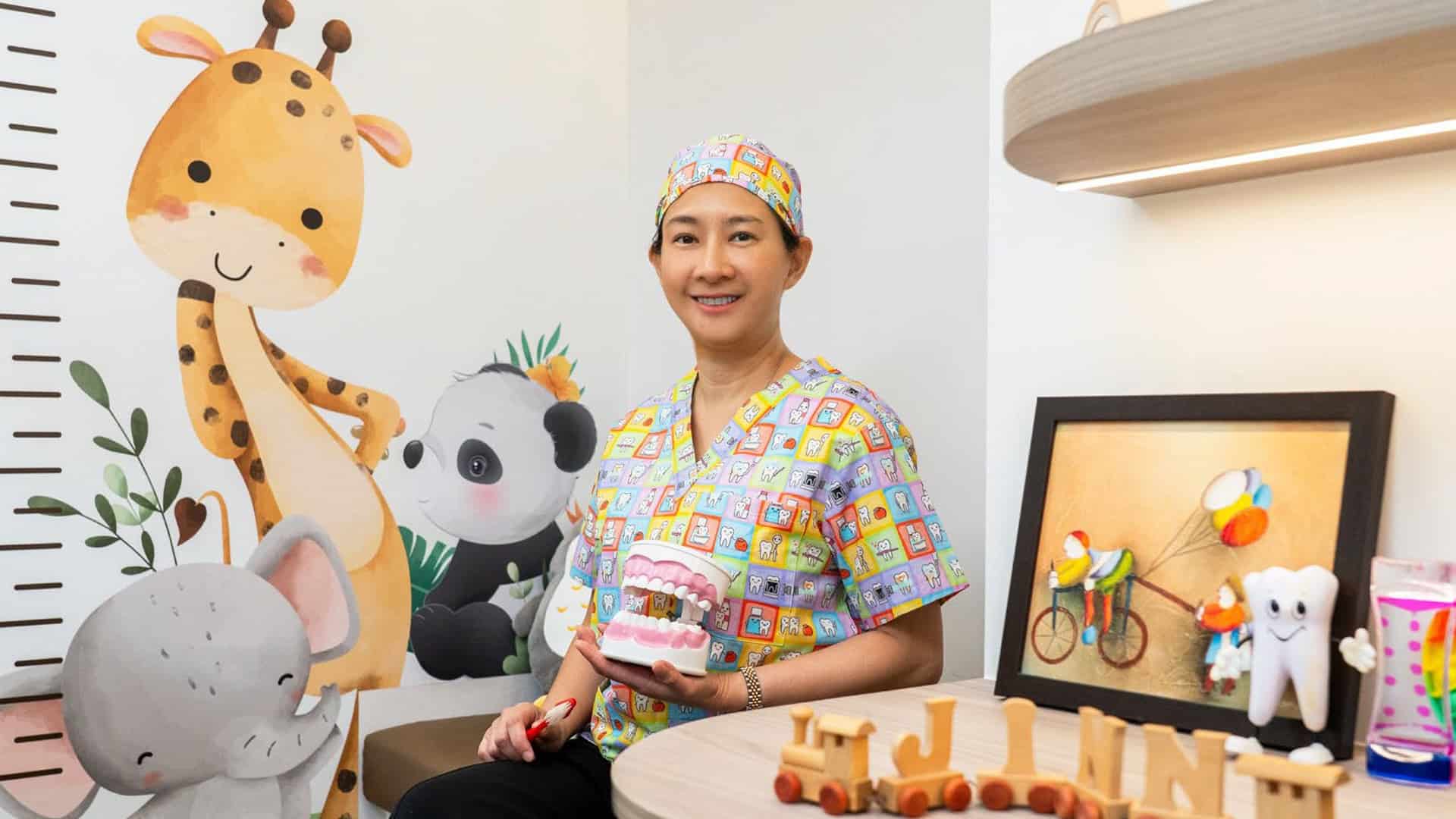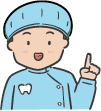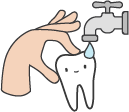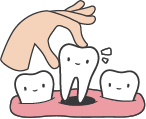Paediatric Dentistry Services*
- First dental visit for infants
- Tongue tie release for infants
- Dental care for children, including those who are medically compromised, or have special needs
- Urgent and long-term management of dental trauma injuries
- Interdisciplinary management of dental anomalies
*Consultation and treatment are done by a specialist in paediatric dentistry.
Regular six-monthly visits to the dentist are important to track your child’s dental development and identify any oral health issues early.
We encourage parents to schedule their child’s first dental visit before they turn one, or when their first tooth emerges.
Paediatric Dentistry FAQs
When should I start brushing my child’s teeth?
Brushing should be incorporated early into your child’s daily routine as it is an important part of their overall hygiene and health. In fact, cleaning should begin even before the first tooth appears. Establishing good habits early helps your child get used to having their oral cavity cleaned and prevents future problems. For babies, start by using a clean, damp gauze pad or soft cloth to gently wipe their gums twice a day — especially after feeding and before bedtime.
As soon as the first tooth emerges, typically around six months of age, you should begin brushing. Use a small, round head, soft-bristled nylon toothbrush. An adult should do the brushing twice a day until your child develops the skills to do it thoroughly on their own, usually around the age of seven or eight. Your paediatric dentist can advise you on the appropriate amount and type of toothpaste for your child, and whether flossing is needed.
Tips to Make Brushing Fun
🎵 Play a brushing song or use a timer
A fun two-minute song or video can help your child brush for the recommended amount of time. There are also free apps that can help make the routine interactive and rewarding.
👨👩👧 Brush together
Turn it into a family routine. Children love to imitate grown-ups, so brushing side-by-side makes it feel like a team effort.
🎯 Turn it into a game
Get creative! Pretend to “chase away sugar bugs,” count teeth as you brush them, or create a brushing reward chart with stickers. You can also use disclosing toothpastes, which stains plaque, and compete to see who can brush away the most stains.
📚 Read or watch stories about brushing
Books and videos with friendly characters who enjoy brushing can normalise the habit and make it fun instead of a chore.
No matter how simple or difficult the brushing routine, always offer praise and encouragement to celebrate their effort. A little cheer or hug goes a long way in reinforcing good habits. If brushing is a daily struggle, be sure to speak to your paediatric dentist. We are here to help with tips tailored to your child’s personality and needs, especially for those with sensory sensitivities or special needs.

Paediatric Dentistry and Neurodivergent Children: How Can I Make My Child’s Home Oral Care Routine More Comfortable?
Establishing new routines, such as toothbrushing, becomes more challenging as your child grows older. That is why it is important to start early. Caring for the oral health of neurodivergent children requires a sensitive, structured, and personalised approach.
At what age should I bring my child for their first dental visit, and how do I prepare my child for this?
Your child should have their first dental visit by their first birthday or within six months of the first tooth erupting, whichever comes first. This early visit is crucial for ensuring proper oral development, allowing the dentist to detect any early issues, and providing parents with essential guidance on home care, feeding habits, and fluoride use.
If your little one has already turned one year old, not to worry! Just book an appointment as soon as possible. Remember, the first dental visit can be much more stressful if your child only comes in when they have a toothache.
To prepare your child
Keep it positive
Always speak positively about the dentist. Avoid using words like "pain", "needle", or "pull".
Pretend play at home
Let your child practise opening their mouth while you count their teeth. Use a toothbrush or mirror to role-play a “mini checkup”.
Use appropriate visual aids
Read children's books or watch videos about visiting the dentist. These can help familiarise them with the experience.
Schedule wisely
Schedule the visit at a time when your child is usually well-rested and fed, so as to ensure they are in the best mood.
Bring comfort items
A favourite toy or blanket can help your child feel secure and at ease during the visit.
What happens during the first dental visit?
The first visit is typically gentle and preventive. It includes:
- A thorough check of your child’s teeth, gums, bite, and oral development.
- Cleaning of your child’s teeth (if needed) and application of fluoride.
- A discussion on brushing, diet advice, and how to prevent cavities tailored specifically to your child. Age-specific risk factors will also be discussed, for example, nursing habits for infants, and dental trauma prevention and first-aid for active children.
The dentist will examine your child in the dental chair. Depending on their age, we may need you to sit with your child and help us hold and support them. Infants and toddlers may cry during checkups, while older kids can sometimes be nervous or hesitant. This is all perfectly normal, and our dental team are here to guide you and your child through the process.
Please also bring your child’s toothbrush and toothpaste so that the dentist can assess whether they are suitable. It also gives us an opportunity to practise tooth brushing techniques together!
Based on the examination and discussion, the dentist may offer teeth cleaning (for removal of plaque / stains or to introduce your child to the dental instruments) and topical fluoride application (for decay prevention). If your child requires treatment, the dentist will give their recommendations and discuss treatment options with you. Simple procedures may be offered if time permits and the child is comfortable and ready for treatment. Other required treatments are generally scheduled for the next visit.
Since baby teeth will eventually fall out, do I still need to bring my child to the dentist?
Yes. Baby (primary) teeth may be temporary, but they play a critical role in your child’s overall health and development. These teeth play a vital role in helping your child chew, speak, and smile confidently. They also hold the space and guide the proper alignment of adult (permanent) teeth.
Having good oral health also prevents tooth decay which can cause pain, infections, and early tooth loss that can affect your child’s eating, learning, sleeping, and growth. Early and regular visits to the dentist allow for early detection of problems and guidance for healthy habits, helping your child avoid more complex treatment later.
Infant Oral Health Package for children aged 6 months to 18 months old:
This Infant Oral Health package includes:
- Consultation with the Paediatric Dentist
- Fluoride Application
- Consumables
How often should my child visit the dentist?
In general, children should visit the dentist every six months. Regular checkups allow your dentist to:
- Detect problems like decay early before they cause discomfort
- Monitor jaw and tooth development so that issues can be identified and treated early
- Provide personalised advice on brushing, diet, habits (such as thumb-sucking), and fluoride use
Sometimes, your dentist may recommend a different schedule based on your child’s oral health needs. More frequent visits may be advised if your child is at higher risk of cavities, has special healthcare needs, is undergoing treatment, or needs closer monitoring for dental trauma or the growth of their teeth.
What are the signs that my child needs urgent dental attention?
If your child shows any of the following signs, it is best to see a dentist as soon as possible:
Severe or persistent toothache
Pain that lasts more than a day, disturbs sleep, or worsens with pressure, chewing, or body temperature changes, may signal infection or deep decay.
Signs of infection
Fever, swollen lymph nodes, bad breath, a lump, or pus near the teeth or gums may indicate a dental abscess that needs prompt treatment.
Swelling of the face, cheek, or gums
This may indicate a spreading infection and should be treated urgently to prevent complications.
Dental trauma or injury
If your child has a knocked-out, cracked, broken, or displaced tooth after a fall or accident, see a dentist immediately, especially for permanent teeth. Time is critical especially for a knocked-out permanent teeth.
What to do if your child injures their mouth or tooth?
Uncontrolled bleeding from the mouth or gums after a fall or oral injury
If bleeding does not stop after 10 to 15 minutes of gentle pressure, urgent care is needed.
Objects stuck between teeth or in the gums
Do not try to force it out — a dentist can safely remove the object without damaging the teeth or soft tissues.
What should I do if my child injures their teeth or mouth?

| Event | What to Do |
|---|---|
| If a permanent tooth is knocked out (avulsed) |
• Find the tooth and hold it by the crown (the white part), not the root. • If dirty, gently rinse with saline or milk. Do not scrub or dry. • Try to place it back in the socket if your child is alert and cooperative. • If not possible, store in cold fresh milk, saline, saliva, or inside your child’s cheek (if safe). • See a dentist or go to the emergency room immediately — ideally within 30 minutes. 


|
| If a baby tooth is knocked out |
• Do not try to reinsert it — this can damage the developing permanent tooth underneath. • Call your dentist and schedule an appointment as soon as possible. 

|
| If a tooth is chipped, broken, or displaced |
• Rinse your child’s mouth with water and check for bleeding or sharp edges. • Locate and save any broken fragments if possible and bring them to the dentist. • Offer a cold compress for swelling and pain relief. • Call your dentist and schedule an appointment as soon as possible. |
| If there is bleeding from the gums, lips, or tongue |
• Apply gentle pressure with a clean cloth or gauze. • Use a cold compress to reduce swelling. • Seek care if bleeding doesn’t stop within 10–15 minutes, or if the injury is deep — stitches may be needed. |
How to get there: Raffles 24 Acute & Critical Care at Raffles Hospital
Even minor injuries can affect the development of permanent teeth or lead to long-term issues if not assessed.
If in doubt, do not hesitate to contact our clinic for advice. Early care can prevent complications and ease discomfort.
When might my child benefit from seeing a paediatric dentist?
At Raffles Dental, many of our general dentists are experienced in caring for children, from routine checkups to fillings and preventive care. For most children, this provides a strong foundation for lifelong oral health.
However, in some situations, your child may benefit from seeing a paediatric dental specialist. A referral to a paediatric dentist simply means your dentist wants to ensure your child receives the most tailored and supportive care possible.
Paediatric dentists undergo additional years of specialised training dedicated to the oral health of children. This covers everything from dental development and behaviour guidance to caring for children with special healthcare needs. Your child may be referred to a paediatric dentist if:
- They are very young, have severe dental anxiety, or find it difficult to cooperate at dental visits.
- They have complex dental needs (e.g. dental trauma, dental developmental conditions, extensive decay).
- They require treatment under sedation or general anaesthesia.
- They have medical conditions, special needs, or sensory sensitivities that affect dental care.
- You or your child would benefit from additional guidance on habits like thumb-sucking, teething, or oral hygiene routines.
Paediatric dentists use child-specific techniques, equipment, and approaches to create a positive and calm experience, which helps children build lifelong comfort with dental care. Our paediatric dentist works together with our general dentists to provide collaborative, child-centred, and compassionate dental care, offering support when needed and ensuring that families feel confident, informed, and well cared for. Together, we aim to help each child grow up healthy and with the confidence to smile.
